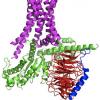Hey guys (and ladies!),
I'm a 28 yo male.
Weight: 235
BodyFat%: 12%
IGF-1: 231 ng/ml
Insulin (Fasting): 7.6 uIU/ml
Having bad cholesterol, I decided to switch to a very low-carb diet. I was <50g carb/day and was deep in ketosis for about 4 months. Big changes happened. Triglycerides went from 300-400 down to 80-95 (-70%). HDL went from 26->40 (+55%). LDL+VLDL went from 136 -> 130 (-4%). Lipid profiles (so far as I can tell), don't change that rapidly so I expect the results to improve over the next year.
For the first time in my life, I have blood work that indicates I'm not at risk for diabetes or heart disease. In the "before" era, I was in OK shape (16% bf). I didnt drink sodas, eat dessert or candy etc. I ate normal 'balanced' meals that included rice, whole grain etc.. So I maybe I just had bad genetics, maybe thats why my bloodwork sucked. WELL, nurture > nature.
Now there are some downsides to being in ketosis:
1. Fatigue: You muscles lose all their glycogen stores and replace them with triacylglycerol - triacylglycerol isn't as oxygen efficient in its metabolism. This means that you can't excercise close to your aerobic threshhold for very long at all.
2. Insulin Resistence: When you first start going into ketosis, your fasting blood glucose is AMAZING. My fasting glucose went into the high seventies. However, prolonged ketosis causes insulin resistence & increased fasting blood glucose. By 4 months in my blood glucose was mid/high nineties. This isn't normal insulin resistence -> it exists to route all existing glucose to the brain instead of the muscles and is reversed once you start consuming carbs (oddly enough).
For these reasons, I have stopped trying to be in ketosis and instead am doing just a low carb diet. Still no grains, no sugar (except that found in fruit), and few starchy veggies. What's the difference you might ask? Well I have added things like beans and fruit back into my diet. I'll post results in a month or two and we will see how that impacts the above results.
As I was reading up on ketosis and its effects. I found that the ketogenic diet was invented a long time ago (100 years) to treat epilepsy. The reason that it helps with epilepsy is that the brain starts consuming ketone bodies instead of glucose when in ketosis. This prevents seizures! So as a result lots of epileptic children were put on ketogenic diets. And... they found that when kids were put on ketogenic diets their height and weight velocity (increase / year) was very significantly slowed. This will start sounding very familiar to you dwarf mice fans -- Now guess what was happening...? Their IGF-1 levels dropped significantly from being in ketosis and it became evident that their growth was stunted. (Can provided references)
Ketosis causes IGF-1 to drop because a ketogenic diet isn't just a low carb diet, its a HIGH FAT DIET! Don't think 'Atkins' where you are eating steak and veggies. You have to control you protien intake as well (though it should be up a little bit). In a ketogenic diet, 75+% of your calories are going to come from fat! It might be starting to dawn on you how ludicous it felt: I was eating cheesy eggs & bacon to improve my risk for heart disease!!!! The reason that I mention that the ketogenic diet is really a high fat diet is because fat is the only macro-nutrient that doesn't stimulate insulin. Carbs stimulate insulin and to a lesser exent protien does as well. The picture should be pretty clear at this point how ketosis should impact IGF-1: High fat, medium protien and low carbs should radically lower the IGF-1 levels. And (as I'm hoping this audience already knows), IGF-1 levels dramatically effect aging in almost every animal its been studied in!
Now on to my question!!!
So I (kind of) screwed up. I didn't get a 'before' IGF-1 test. If you are going to do the same protocol, do this one thing. Get a complete 'before' test before you start - I was too axious to start, and boy I wish I had gotten it done. So here is my predicament:
I don't have a baseline for my before 'IGF-1', now as a secondary problem I went out of ketosis and switched to just being low-carb about a 3 days before my blood work.... I know, I know. Ughhhh. To make matters worse, the baseline for IGF-1 is very ambiguous and every single source that I have read has a different reference interval for IGF-1 for my age group. Some show its sex dependent some show its not. So are my IGF-1 and/or insulin levels low?
Anyways, thanks for reading. Please post if you found this interesting, would like to know more or think you can help answer my questions!!!





























































